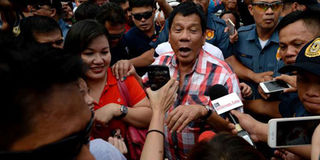Philippine leader's plan on death penalty 'faces opposition

Rodrigo Duterte after casting his vote at Daniel Aguinaldo National High School in Davao City on the southern island of Mindanao in the Philippines on May 9, 2016. PHOTO AFP | NOEL CELIS
What you need to know:
Philippines abolished the death penalty in 2006.
MANILA, Tuesday
A plan by Philippine president-elect Rodrigo Duterte to restore the death penalty faces strong opposition including from the dominant Roman Catholic Church, officials and analysts said Tuesday.
The tough-talking politician vowed Monday to introduce executions by hanging after he takes office on June 30 as part of a ruthless law-and-order crackdown that would also include ordering military snipers to kill suspected criminals.
After putting to death seven convicted criminals by lethal injection in 1999-2000, the Philippines abolished the death penalty in 2006 following stiff opposition from the Catholic Church, the religion of 80 per cent of Filipinos.
'RIGHT TO JUDGE'
“As people of faith, we do not adhere to capital punishment because we do not have the right to judge who should live and who should die,” said Father Lito Jopson, head of the Catholic Bishops’ Communications Office.
Duterte’s landslide May 9 election victory does not sway the bishops’ stance, Jopson told AFP.
Duterte said he would ask Congress to reintroduce capital punishment for drug trafficking, rape, murder, robbery and kidnapping, among others.
While many newly-elected members of Congress have joined Duterte’s ruling coalition, passing such a law is by no means assured, political science professor Javad Heydarian of Manila’s De La Salle University told AFP.
“Duterte at this point has tremendous political capital and crime-busting is the centrepiece of his campaign,” Heydarian said.





